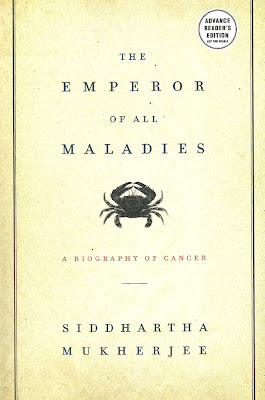Tom gave me the most romantic book for Christmas! Not really. He gave me a book called "The Emperor of All Maladies" by Siddhartha Mukherjee, which is basically a biography of cancer. Not romantic, but still engaging reading.
I usually read in the evenings, after the kids are in bed and the house has quieted down. However, with this book, I found myself picking it up every time I had a free moment at any time of day. I devoured this book because it really hit home.
Not only have I had two rare cancers in my lifetime (Hodgkin's Disease when I was 25 and Sarcoma when I was 40), but my mother battled breast cancer twice, lived for many more years and then finally succumbed to myelodysplastic syndrome which developed into leukemia.
So I have truly been there. I have sat in the doctor’s office feeling dizzy from the blood draining from my head and the overhead florescent lights becoming too bright to bear as I had to absorb the terrible news coming from the doctor’s mouth. I have tried to relax in the recliners in the chemo room as the nurses searched for a vein to start the poisonous drips. I have run my fingers through my hair and pulled away handfuls of hair and dealt with sudden onset baldness not once but twice. (The second time was easier, comparatively speaking.)
I have lived with cancer for a long time but I never really understood the disease and how our attempts to cure it have evolved. After having read this book, I have a more comprehensive view of it than ever before. I have lived it physically and emotionally, now I have a grasp of it intellectually.
One of the things in the book that really surprised me was how chemotherapy is a relatively new field of medicine. Cancer seems to have been around as long as people have been; the first documented case is from Ancient Egypt around 1500 b.c. Doctors and researchers have been fighting it all along but there was little comprehensive effort and no serious government involvement until after World War II.
Over the years, when possible, cancer was treated with surgery. Radiation came along around the turn of the century but wasn't really refined until the 1960's. Chemotherapy came after that.
So modern oncology has only been going for about 50 years. For some reason, I had thought that we were so much further along with oncology. When actually, it’s not that much older than I am.
I know that I was lucky to get my Hodgkin's Disease when I did because of the new treatments that cured me and preserved my fertility - unheard of even 20 years prior. Hodgkin's Disease treatment was a wonderful success that has been difficult to duplicate with other forms of cancer. We have come a long way in these 50 years of modern oncology but we still have so far to go.
All the while I was reading this book, I was hoping for the happy ending. Mukherjee does end the book with hopeful ideas of where future cancer treatments may lead us, but as of yet there is no magic bullet. The best we can hope for right now is to still just keep holding on...

No comments:
Post a Comment